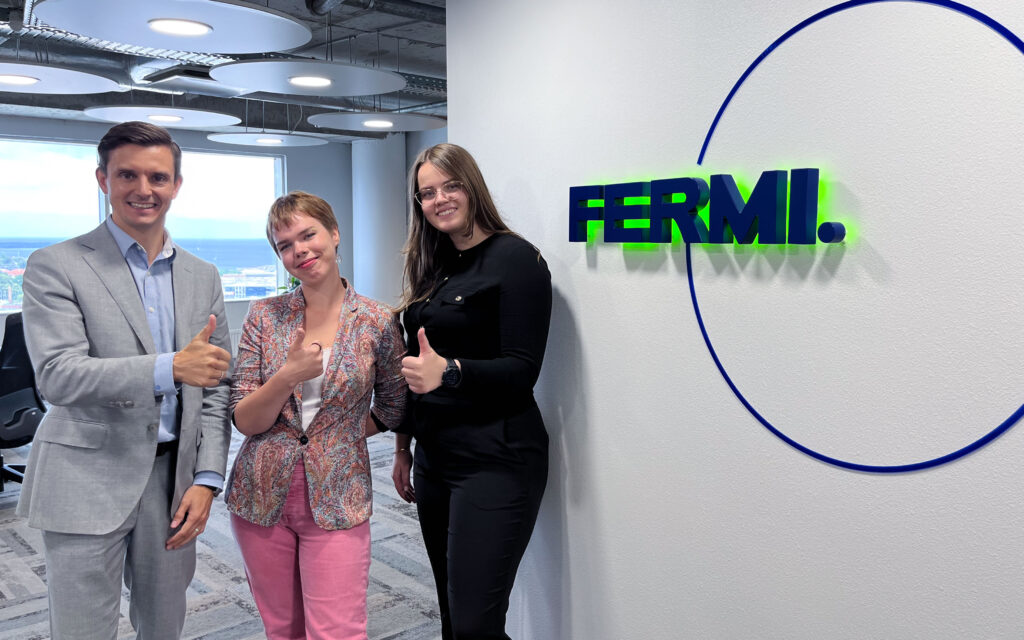Fermi Energia, a company planning to build a small nuclear power plant in Estonia, has sent two students to Scandinavian universities to study nuclear engineering. In total, the nuclear scholarship programme has seven students, some of whom have already graduated and started working in international nuclear companies.
Carmen Tamm and Sanna Kruusmaa were awarded the 2024 scholarships. Carmen Tamm graduated from the Faculty of Engineering of TUT with a degree in Electroengineering and Mechatronics and is continuing her studies at the Faculty of Nuclear Engineering at the Royal Swedish Institute of Technology (KTH). After graduation, he plans to return to Estonia to contribute to the transition from oil shale to modern nuclear energy.
Sanna Kruusmaa, who graduated from the University of Tartu with a degree in Physics, Chemistry and Materials Science, will continue her studies in elementary particle physics at the Faculty of Physics at Uppsala University, Scandinavia's oldest university. His research interests include the detection and measurement of ionising radiation. "After finishing my studies, I would like to contribute to the Fermi Energy project to study the radiation background of nuclear power plants or join an international organisation such as the IAEA, where I could work on the implementation of radiation monitoring or non-proliferation monitoring," said Kruusmaa.
The first two students, Rainer Kelk and Mihkel Aavik, were awarded the Fermi Energy Fellowship in 2021. Today, they have successfully completed their studies and obtained a Master's degree in Nuclear Engineering. Rainer Kelk, who obtained his Master's degree in Nuclear Engineering at the Federal Institute of Technology Lausanne (EPFL) and the ETHZ (ETH Zurich) in the framework of a joint programme, completed a traineeship at the Swiss state-owned company Nagra, which is involved in the planning of final disposal of radioactive waste. He is currently pursuing his studies at the Paul Scherrer Institute, Switzerland's largest research centre for natural sciences and technology. His doctoral thesis is on the application of machine learning to the analysis of severe nuclear accidents.
Mihkel Aavik graduated from the European Master's in Nuclear Energy and joined Edvance, part of the French nuclear operator EDF. There he is involved in the design of electrical systems for the EPR1200 reactor.
The second and third waves of scholarship winners included students Elise Poom, Ayrton Hüüs and Hendrik Vija. All of them studied at the Faculty of Nuclear Engineering at the Royal Swedish Institute of Technology (KTH).
After graduating, Elise Poom studied nuclear waste management in Italy and currently works for Westinghouse Electric, a company developing nuclear reactors.
Ayrton Hüüs, who has already worked as an engineer-mechanic, plans to do an engineering apprenticeship at the Canadian company WSP to study the use of small reactors in marine propulsion systems.
Hendrik Vija, who graduated cum laude with honours from the University of Tartu's Mathematics Department, is due to complete his Master's degree this year and then plans to pursue doctoral studies.
Fermi Scholarship
The Fermi Energy grant (€1000 per month) is awarded for two academic years. After graduation, the scholarship holder must work at Fermi Energy for three years. Find out more about the scholarship: fermi.ee/scholarship/
N.B.: Applications for masters programmes at foreign universities are accepted in winter. Scholarship applicants should therefore start preparing their documents in the autumn.

